Wish your links could work magic overnight and keep those SEO gains rolling forever?
Sorry, quick-win seekers — white hat link-building is the ONLY legit way to score top-quality links, build lasting authority, and secure rankings up to Google’s best practices.
That’s the exact philosophy we follow in our white-hat link building services Editorial.Link, where every backlink is earned the right way.
So, if earning great backlinks is all about following Google’s guidelines, why do both SEO rookies and pros still find going “white hat” a challenge?
Or is it more than just sticking to the rules?
To help you confidently navigate white hat link-building, read this post and learn:
- What is white hat link-building
- Types of links you can call “white-hat”
- The difference between “grey, black, and white hat” link-building strategies
- White hat link-building techniques worth applying in your SEO strategy
- White hat link-building services: an alternative way to get high-quality links
What Is White Hat Link Building?
White hat link-building is using safe, Google-approved strategies when building and acquiring links.
But to be dead honest here, the whole concept of “Google-approved” link-building is pretty vague in itself. That’s because Google lowkey sees it as acceptable — but still a bit of a loophole to game the rankings.
Probably for this very reason, Google doesn’t hand out a clear link acquisition rulebook.
What it does offer is a set of broad do’s and don’ts — more like hints at what’s considered “safe” if you want to rank well.
Here’s Google’s official word on links:
👉SEO Link Best Practices for Google — a curated list of merely technical recommendations to keep your links clean and crawlable. You won’t find much on how to actually get links here, but you will find proven ways to make your pages more findable and relevant, helping Google push them up the rankings.
💡Pro-tip! Among the "do's" like improving link crawlability and tips on internal linking, you'll see that Google isn’t really against external linking — the core of any link-building strategy. But only on the condition that it adds direct value to users, like citing a source or providing relevant, extra info.

The same goes for paid links or links from unverified sources. Google doesn’t forbid them, but only if you notify search engines by marking them as "sponsored," "nofollow," or with the "UGC" tag.

As you may see, in most cases, Google gives subtle hints about what’s okay and under which circumstances.
However, sometimes there are clear, no-excuse warnings about penalties — like in the case of keyword-stuffing anchors for your links.
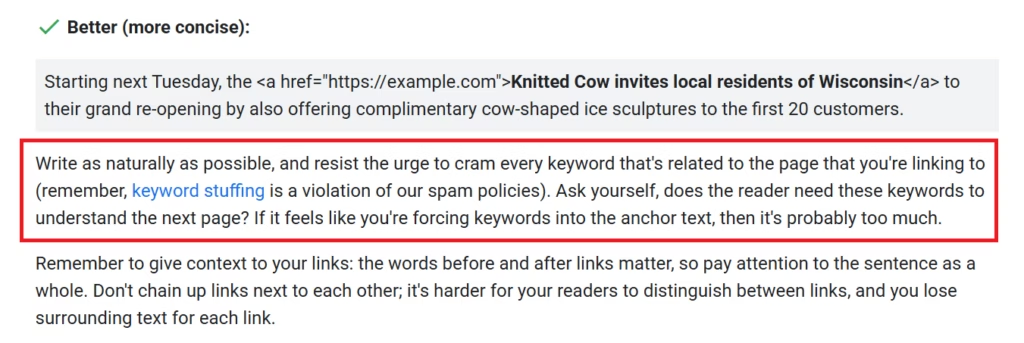
From this, you can infer — as long as you follow these technicalities prescribed for links, some direct and some implied, you’re practicing white-hat link-building.
👉Link Spam Policy — this is your “don’t even go there” list — mainly calling out shady link practices, along with a bunch of other no-nos straight from Google Spam policies.
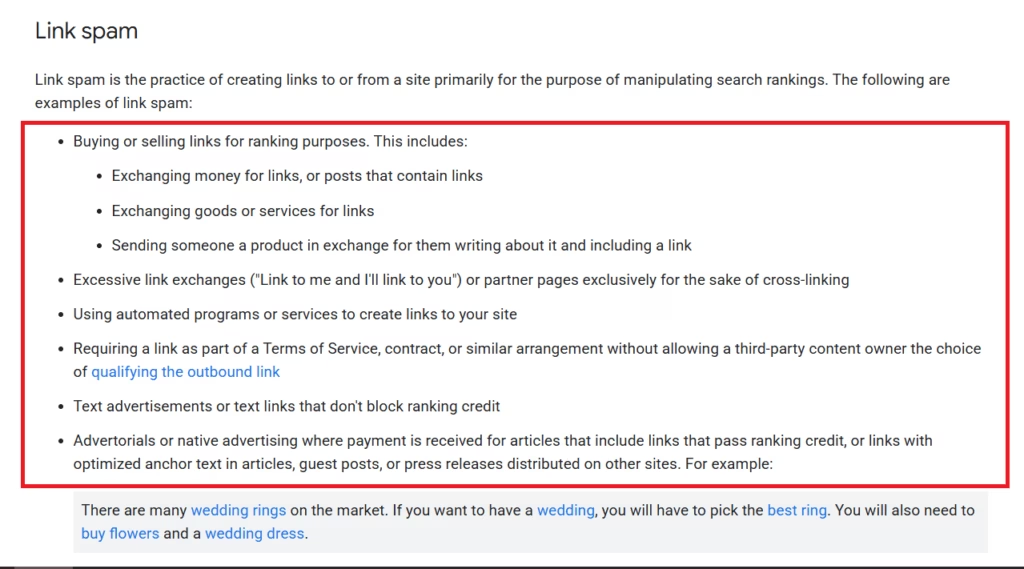
Use any of these tactics purely to manipulate rankings, and you’re ditching white-hat link building for a fast track to getting downranked, drained of traffic, and ghosted by Google.
⚠️BOTTOMLINE: Anything that goes against Google’s rules or tries to bypass its guidelines on building, acquiring, and especially using links — is NOT ethical link-building (white hat SEO link-building).
More Link-Building Moves That Scream “Penalty Incoming”
- Unnatural linking (paid, spammy, excessive link exchange)
- Hidden linking (cloaking)
- Link schemes (PBNs, link farms, linking to low-quality websites)
- Use of automated software for mass linking
- Comment spam links & Doorways
What Backlinks Can You Call “White Hat”?
Links you can call “white-hat” are simply earned the right way — organically, particularly through active link-building outreach.
And if you ask me about safety, this method is just bulletproof. Webmasters, editors, and site owners voluntarily link to your content because they choose to, seeing it as unique, valuable, and helpful to their audience.
Google approves.
💡Pro-tip! Speaking of the approval, crafting analytical and data-driven content can really get you ahead. For instance, here at Editorial.Link, we trust our own stats and run yearly surveys with practicing SEOs on topics that matter.
It paid off — just recently, NeilPatel, a key SEO resource, included stats from our Link Building Statistics 2025 in their article, “Ecommerce Link Building: What Works and What Doesn’t Today”.
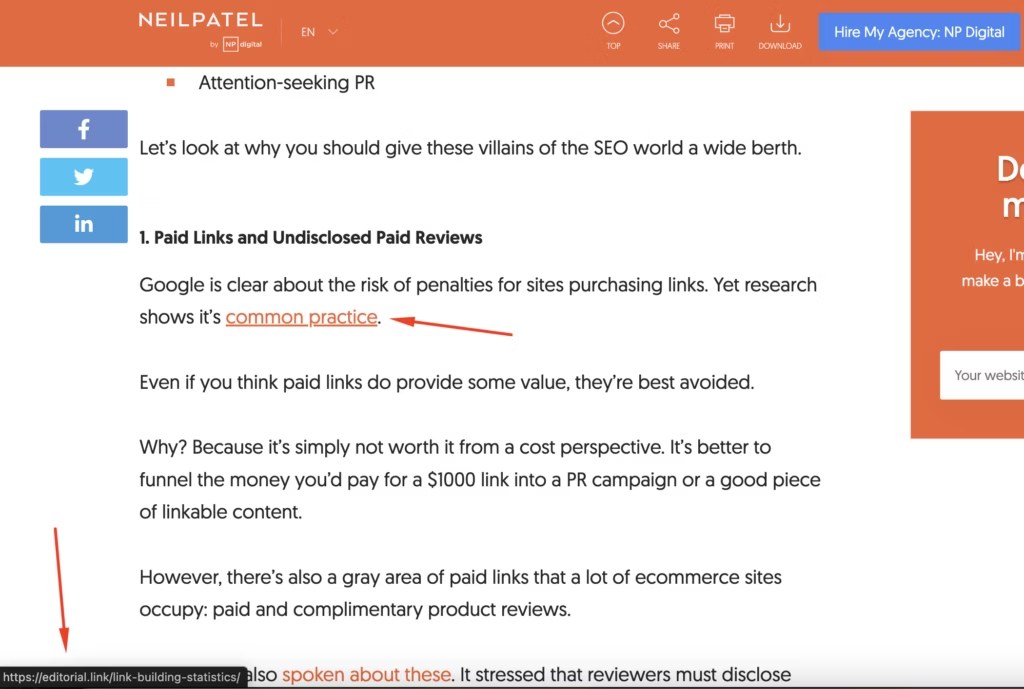
A link landed without much hassle!

Well, technically, it took a lot of time and effort — hours of compiling the data and reaching out to experts, but this resource will keep attracting links organically for years to come — it’s totally worth it!
White Hat vs Grey Hat vs Black Hat Link Building
Now that you know what link-building “white hat” style is, you’ve probably thought of its direct opposite — black hat link-building.
But the distinction lies in simple logic: white hat covers linking practices that strictly line up with Google’s prescriptions, while black hat link-building is breaking them solely for the sake of speedy SEO results.
Unfortunately for black hatters, forbidden linking practices get caught in 100 out of 100 cases — whether it's manual penalties, algorithmic downgrades, or even deindexing. It's a steep price to pay for a win that’s never guaranteed.
💡Pro-tip! You can also think of black hat vs. white hat link-building strategies as the difference between organic and non-organic linking.
For example, practicing HARO link-building and actively sharing your expertise with journalists who create original content and feature top voices in the industry is one of the best white hat SEO link-building tips you can find.
That’s exactly how I recently helped Editorial.Link earn a fresh backlink from SEOptimer, a highly respected authority, by offering my observations on Google’s current ranking trends.
All organic and white hat!
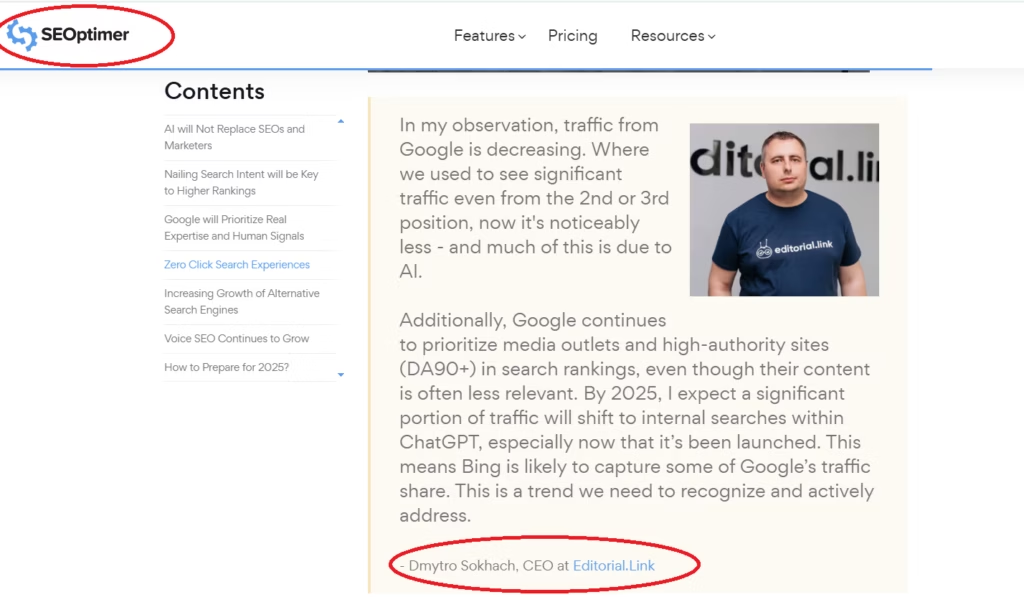
On the contrary, links obtained from a PBN have nothing to do with organic ones. These are designed to “intentionally manipulate rankings”, and if you read Google’s Search Quality Rater Guidelines, are called "unnatural"— in other words, black hat.
Check yourself: how risky is your link?
🟢 White Hat – Clean, safe, and Google-approved!
⚫ Black Hat – Penalties incoming!
⚪ Grey Hat – A close call.. not banned, but not blessed either!
Does Google have clear rules about grey hat link-building?
Well… yes and no. Think of it this way: it’s more about reading between the lines. If it’s not explicitly forbidden in the guidelines, it’s technically allowed — but that doesn’t always mean it’s risk-free.
Take link exchanges — even between legit sites, if it’s just a “you scratch my rank, I’ll scratch yours” deal with no real value, it slides straight into grey hat turf.
Or take Google’s double take on paid links. Its Spam Policies clearly define them as a surefire way to get penalized — fair enough. But if you tag your paid links as “no-follow,” “sponsored,” or “UGC,” you are somehow abiding rules, but yet, not completely.
Grey hat?
Yep.
Even though Google won't count these links toward your rankings, they still diversify your backlink profile and can help you rank well in the long run.
In cases like this, the real question is — who exactly are you buying links from? If it’s a paid link from a spammy site, PBN, or link farm, a penalty’s just a matter of time.
But if it’s coming from a reputable, long-standing link-building agency such as Editorial.Link?
That’s a different story.
⚠️BOTTOMLINE: Grey hat backlinks are basically loopholes in Google’s guidelines — they might work today, but who knows about tomorrow. Always keep an eye on where you’re linking, where your links are coming from, and whether you really trust the person/service providing them.
Plenty of slick talkers online promise “high-quality links” for just $5 a pop—but trusting them could tank your rankings. Truly relevant backlinks are never cheap.
Top 5 White Hat Link-Building Techniques
Okay, with Google’s oh-so-”certain” uncertainties, are there 100% safe white-hat link-building techniques you can always count on?
Of course, we got them for you — here’s your magic top 5!
1. HARO Link-Building
HARO link-building stands for landing backlinks by connecting with journalists on HARO — a platform where SEO pros and content creators, journalists and writers collaborate on industry-relevant materials.
HARO link-building has simply become a broad term for sourcing links on platforms that connect content contributors with those looking to feature unique insights — and, of course, link to each other.
Here's how we got featured in Cloudways article — they loved our comment on alternatives search engines, and that earned us a backlink!

2. Digital PR Link-Building
Digital PR link-building is another proven way to score white-hat backlinks in 2025.
It works identically to traditional PR, but instead of just earning media coverage, you're getting valuable links as shoutouts from high-authority sources, publishers, content creators and media outlets.
In fact, it turned out to be one of the most popular link-building tactics in our 2025 Link-Building Statistics — with 48.6% of respondents favoring it over other strategies.
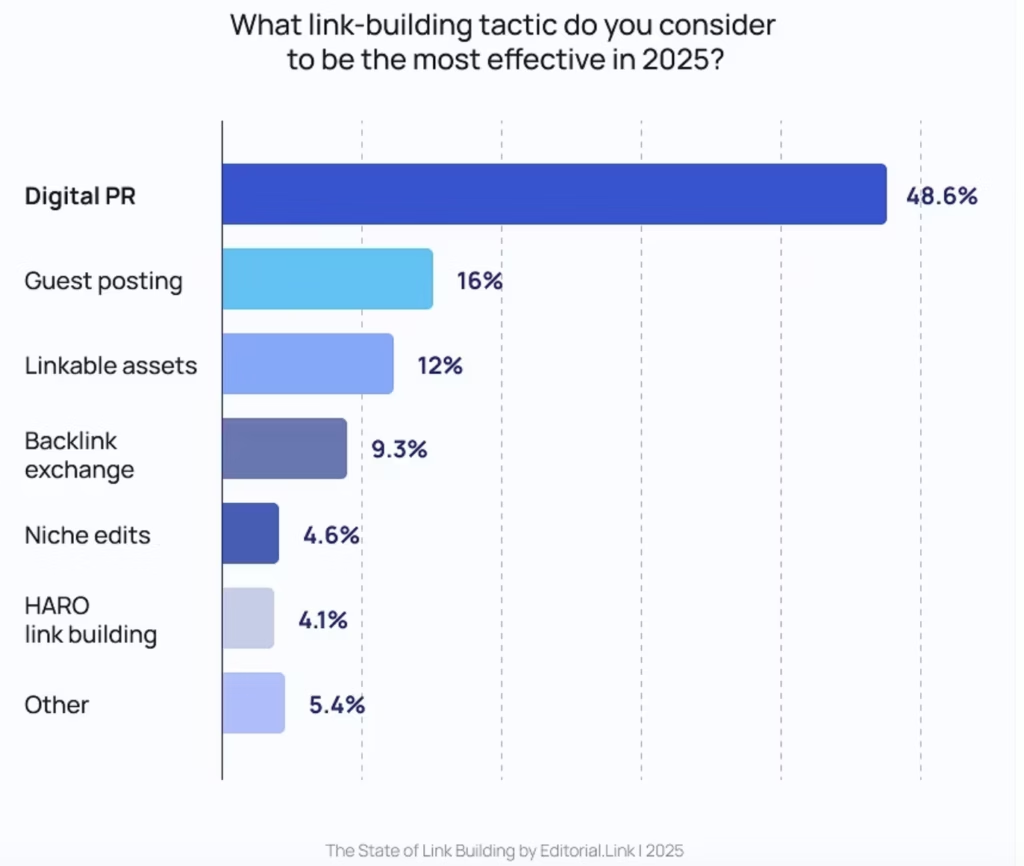
So, how does digital PR work best in 2025? According to Vince Nero’s insights in the BuzzStream 2025 State of Digital PR Report, out of 150 digital PR pros surveyed worldwide, the top-performing tactics are:
📊 Pitching data-led content (99.4%)
🧠 Sharing expert commentary (96.5%)
🎨 Creating hero content (87.9%)
Turns out, those stats line up pretty well with real-world results. When we ran a PR campaign featuring our data-led piece — the 2025 Link-Building Statistics — we landed a solid batch of backlinks.
And not from second-tier sites, either. We’re talking heavy hitters like searchengineland.com neilpatel.com, siegemedia.com, buzzstream.com, toptal.com and plenty more.
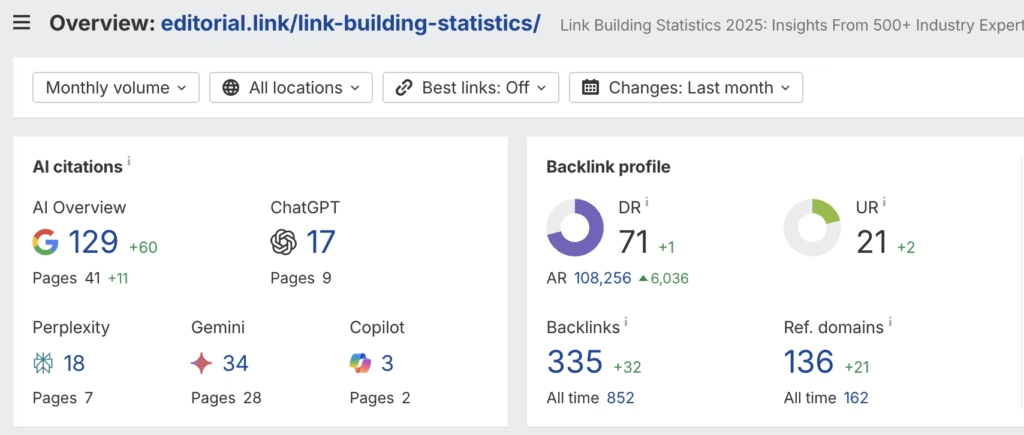
3. Linkable Assets
This white-hat link-building strategy presupposes crafting content that's engaging, relatable, well-researched, and incredibly useful — so much so that others can't help but link to it!
From there you get the naming — linkable assets or link-bait content.
These standout pieces can take many forms — anything from hard-to-find stats, listicles, and free tools to in-depth guides, infographics, industry reviews, or even sharp critiques.
Basically, anything that instantly grabs your niche audience’s attention by tapping into hot topics, trending discussions, or a bit of well-placed controversy in your field.
💡Pro-tip! One of the biggest advantages of using linkable assets for white-hat link-building is how affordable and scalable it is.
You invest time and effort upfront to create something truly valuable and that asset keeps working for you long after it’s published. It naturally attracts backlinks, drives both search and referral traffic, and positions your brand as a go-to resource in your niche.
Just keep it fresh with occasional updates, and watch the backlinks roll in over time.
No wonder this tactic continues to stand the test of time — it delivers real results.
According to our 2025 Link-Building Statistics, it ranked as the third most popular strategy among SEOs, with 12% of respondents choosing it as their go-to.
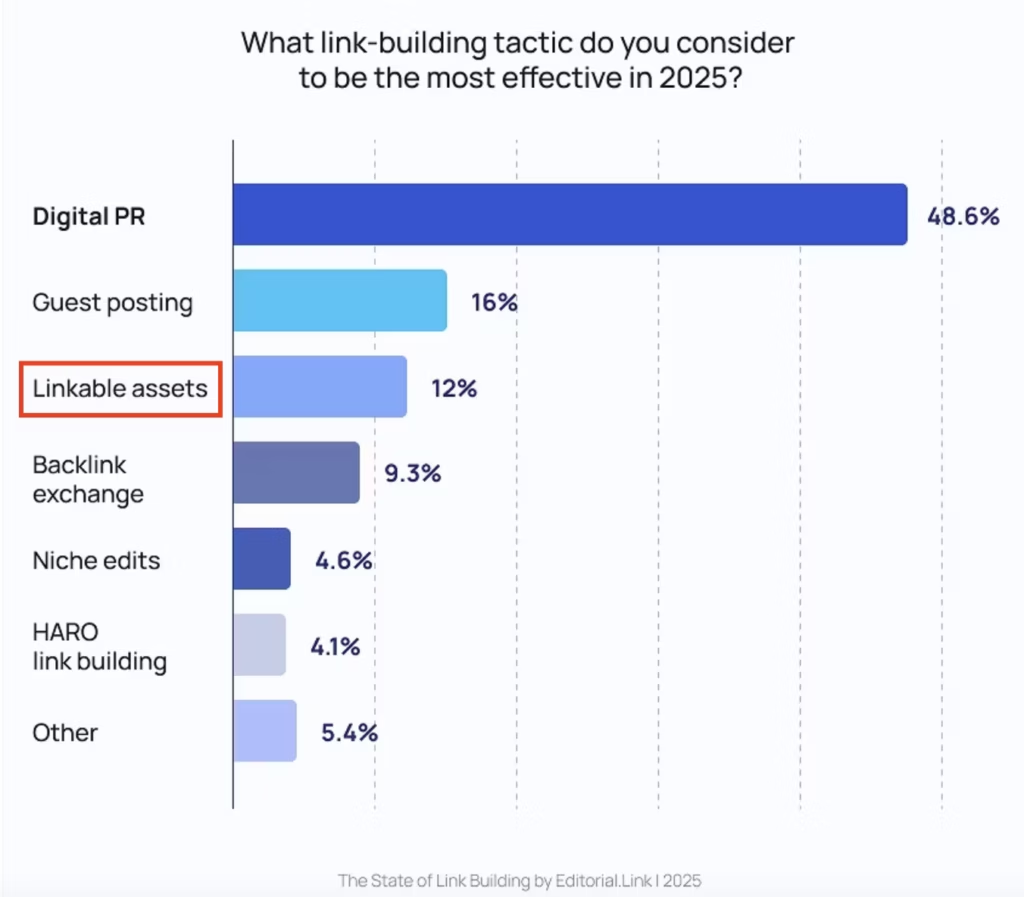
Once again, our stats worked as killer link bait, landing us a backlink from diggitymarketing.com.

The beauty of this tactic is that links from major players, earned through linkable assets, are truly one-of-a-kind.
They're incredibly hard to replicate, which is why, in my opinion, these are some of the best white-hat links you can score.
4. Broken Link-Building
Old but gold!
Broken link-building is simply finding non-functional links in someone else’s content and offering your own content as a better, working alternative on the same topic.
Of course, it takes a bit of legwork. You'll need to do your own research — find 404 pages on websites relevant to your niche (Ahrefs’ Content Explorer is great for that!).
Then, analyze what your competitors have overlooked, evaluate your chances, create a stronger piece of content, and pitch it to the site owner.
If your piece is up to their standards, they won’t mind linking to it — everyone wins here. You are happy with a new link, and them — happy to fill the gap in their content.
5. Unlinked Brand Mentions
Same goes for unlinked mentions — just fire up tools like BuzzSumo, Ahrefs Alerts, Mention.com, or similar to track where your brand’s being mentioned online. Then, simply reach out to the site owner and politely ask if they’d be willing to add a link.
And you shouldn't miss this in 2025. Based on BuzzStream’s 2025 State of Digital PR Report, 64.2% of digital PR pros are prioritizing the conversion of unlinked mentions — an emerging trend aimed at recapturing lost link-building opportunities.
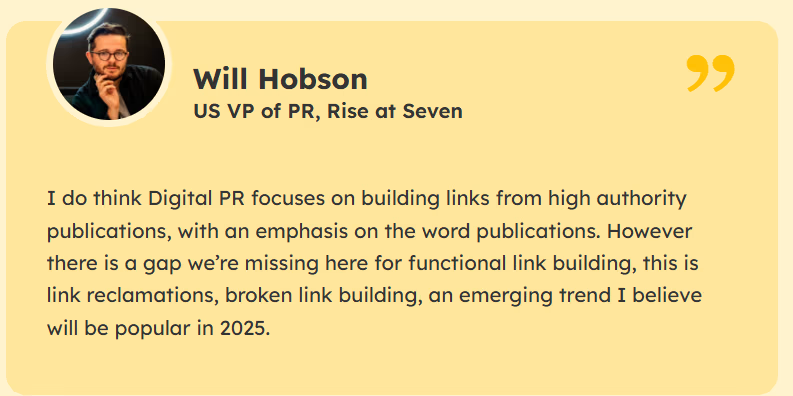
White Hat Link-Building Services: Alternative Option
No matter how much you know about white hat, black hat, or gray hat link-building — and all the tricks to avoid slip-ups — Google's gonna Google, and mistakes are bound to happen.
And when they do, they can hit hard. That’s why sometimes the safest move is turning to a trusted, professional white hat link-building service to keep things clean and above board.
The idea might look good on the surface, I mean we all know how many crooks out there pose themselves as certified link-building pros.
To tell fluff from real expertise, stick to these basic criteria when choosing a white hat link-building service:
👉 Check their credibility
Don’t put your trust in a company that popped up yesterday. White hat link-building services have years of experience to back up their expertise. Longevity speaks for itself.
👉 Consider performance indicators
Longevity alone doesn’t guarantee quality if the service doesn’t meet client expectations. Alternatively, look for success cues — genuine testimonials, case studies, and reviews on approved platforms like Google, Clutch, Trustpilot, or G2.
👉 Ask about their approach
Ensure the agency follows white-hat link-building practices and is transparent about their methods. Don’t be afraid to ask where their links come from, how placements are managed, and whether the relevance and authority of those links align with your objectives.
👉 See how they communicate
White hat link-building services are always open to discussing any questions or concerns you may have. If they refuse to address issues that raise doubts, that's a major red flag.
👉 Gauge their strategy flexibility
Make sure the service you choose offers a multifaceted approach, capable of handling clients with varying levels of complexity. If they only offer generic "take it or leave it" packages, they're not the right fit for your needs.
👉 Figure out their payment policies
White-hat link-building services like my agency Editorial.Link prioritize their reputation, so payment is typically seen as a reward for delivering results.
Many offer post-payment options once the project is completed. Be wary of agencies that ask for money upfront or are unclear about hidden fees — those should be removed from your list right away.
💡Pro-tip! Thinking about handing off your link-building but want to keep it strictly white hat? Reach out to Editorial.Link — we’re a relationship-driven, white-hat link-building agency that truly lives by these values:
🔒 Custom approach
We take the time to understand each client’s unique goals before recommending any solutions — because every business is different, and cookie-cutter plans just don’t cut it.
🔒 Pre-Approvals
Every link we build is tailored to the client’s specific needs and sent for approval to ensure we're on the same page. Nothing goes live without your green light!
🔒 No Scheming
Quality and integrity are non-negotiables for us. We go strictly white-hat, so your link report is always clean — no wooly link sources, no junk links, just real value.
🔒 Real Testimonials
We’re big on transparency when it comes to our results. You’ll find real client testimonials, open access to our content, and honest reviews on trusted platforms like Clutch and Trustpilot — all out there for you to check out.
🔒 Post Payment
With us, it’s simple: we deliver first, you see the results, and then you pay. No upfront commitments — just proof before payment.
Final Words
Sticking to white-hat link-building can be challenging since real SEO results take time. Plus, it’s easy to get tempted by quicker, riskier shortcuts with gray or black-hat tactics. At the end of the day, if you want to earn favor with Google in the long run, going white-hat is your ONLY option.
And if you need a little help, that’s where the pros come in — like us at Editorial.Link. Reach out now and let’s make white-hat link-building strategies the cornerstone of your SEO success.

